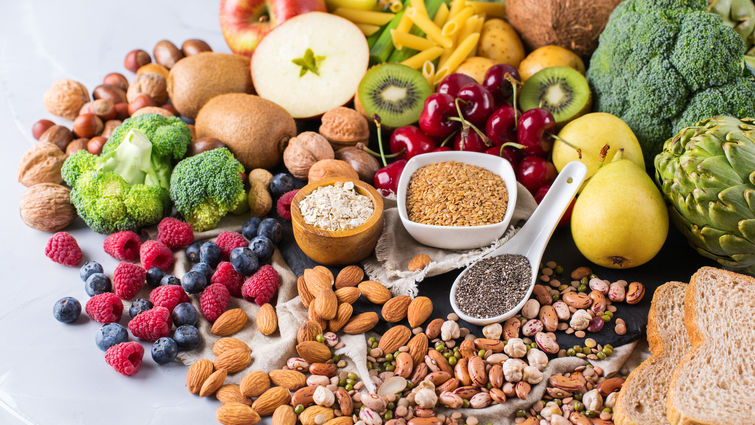
Can.cer is a complex and multifaceted disease, and there is no single food that can cure it. However, research suggests that certain foods can play a role in can.cer prevention or help slow the growth of cancer cells. These foods are rich in antioxidants, vitamins, minerals, and other compounds that can support the immune system and reduce inflammation, which may reduce the risk of cancer. Here are eight foods that are commonly linked to cancer prevention:
1. Cruciferous Vegetables (Broccoli, Kale, Cauliflower, Cabbage)
Cruciferous vegetables are some of the healthiest foods you can eat. They contain compounds like sulforaphane, which have been shown to help detoxify harmful substances in the body. These vegetables may also reduce the risk of cancers, particularly colorectal can.cer. The high fiber content also helps maintain digestive health, which is important for overall cancer prevention.
2. Berries (Blueberries, Strawberries, Raspberries)
Berries are rich in antioxidants, particularly anthocyanins, which give them their vibrant color. These antioxidants help neutralize free radicals – unstable molecules that can cause oxidative damage to cells and contribute to cancer development. Studies suggest that berries might help slow the growth of certain cancer cells and may protect against cancer development, particularly in the case of skin, breast, and colorectal can.cers.
3. Tomatoes
Tomatoes are an excellent source of lycopene, a powerful antioxidant that has been shown to have anticancer properties. Lycopene is particularly effective in reducing the risk of prostate cancer, and some studies have also shown its potential in lowering the risk of other cancers, such as lung and stomach cancers. Lycopene helps neutralize free radicals and reduces inflammation, which can contribute to cancer prevention.
4. Garlic
Garlic has long been known for its health benefits, and its can.cer-fighting properties are no exception. Garlic contains sulfur compounds like allicin that have been shown to have anticancer effects. These compounds may help reduce the risk of cancers, including stomach, esophageal, and colorectal cancer. Garlic also boosts the immune system and has anti-inflammatory effects, which can play a key role in preventing can.cer development.

5. Green Tea
Green tea is loaded with polyphenols, particularly epigallocatechin gallate (EGCG), which has antioxidant and anticancer properties. Studies suggest that green tea may help inhibit the growth of cancer cells, particularly in breast, ovarian, and colorectal cancers. Drinking green tea regularly may provide added protection against cancer, thanks to its ability to reduce oxidative stress and inflammation.
6. Turmeric
Turmeric, particularly its active compound curcumin, has powerful anti-inflammatory and antioxidant properties. Curcumin has been found to slow the growth of cancer cells and inhibit the spread of certain types of cancer, such as breast, colon, and pancreatic cancer. Regular consumption of turmeric in cooking or as a supplement may help lower the risk of cancer and support overall health.
7. Carrots
Carrots are rich in beta-carotene, which is converted into vitamin A in the body. Vitamin A plays an important role in cell growth, immune function, and repair. Studies have suggested that a diet rich in beta-carotene may help lower the risk of lung, breast, and prostate cancer. Carrots also provide fiber and other essential nutrients that support general health and reduce inflammation.

8. Nuts (Especially Walnuts)
Nuts, particularly walnuts, are a great source of healthy fats, antioxidants, and polyphenols. Some studies suggest that the compounds found in walnuts may help inhibit the growth of cancer cells, particularly in breast and prostate cancers. Walnuts are also rich in omega-3 fatty acids, which have been shown to have anti-inflammatory properties that can help protect against can.cer.
How to Prevent Can.cer Through Lifestyle and Diet
Can.cer prevention isn’t about one single food or habit – it’s about the combination of daily choices that support your body’s natural defense system.
Even if you have a family history of can.cer, you can significantly lower your risk by taking care of your diet, environment, and mental health.
Below are practical, science-based ways to protect yourself from can.cer naturally.
1. Adopt a Plant-Based Diet
A diet rich in fruits, vegetables, legumes, whole grains, and nuts gives your body antioxidants, fiber, and phytonutrients that help repair DNA and destroy abnormal cells before they develop into tumors.
Tips:
Fill at least half your plate with vegetables at every meal.
Choose colorful produce – each color offers unique cancer-fighting compounds.
Limit red meat (beef, pork, lamb) and avoid processed meats like bacon, ham, and sausages.
Replace animal fats with healthy oils such as olive or avocado oil.
2. Stay Hydrated and Support Detoxification
Water is essential for flushing toxins from your body and maintaining organ function.
When your kidneys and liver are well-hydrated, they can better eliminate carcinogenic substances.
Tips:
Drink 6–8 glasses of water daily.
Limit sugary drinks, sodas, and excessive alcohol.
Add lemon or cucumber slices to water for a natural detox boost.
3. Quit Smoking and Limit Alcohol
Smoking is the leading preventable cause of cancer, responsible for nearly 90% of lung cancer cases and many others.
Alcohol, even in moderate amounts, increases the risk of liver, breast, and colon cancers.
Tips:
If you smoke, seek help from cessation programs or nicotine therapies.
Replace social drinking with mocktails, kombucha, or sparkling water.
Remember: even small reductions in alcohol can improve your long-term health.
4. Stay Physically Active
Regular exercise helps regulate hormones, strengthen immunity, and reduce inflammation – all crucial for cancer prevention. It also helps maintain a healthy weight, as obesity increases the risk of at least 13 types of can.cer.
Tips:
Engage in at least 30 minutes of moderate activity (walking, cycling, yoga) 5 days a week.
Add strength training twice a week to maintain muscle mass.
Choose movement you enjoy so it becomes part of your lifestyle.
5. Maintain a Healthy Weight
Excess body fat produces inflammatory hormones and insulin, which can stimulate cancer growth.
Keeping your weight in a healthy range helps protect against breast, colon, pancreatic, and kidney cancers.
Tips:
Track your BMI (Body Mass Index) and waist circumference.
Focus on balanced meals with lean protein and fiber.
Avoid late-night snacking and sugary drinks.
6. Protect Your Skin from UV Damage
Excessive exposure to ultraviolet rays is the main cause of skin cancer. Even on cloudy days, UV rays can damage your skin cells.
Tips:
Always apply broad-spectrum sunscreen (SPF 30+).
Wear protective clothing, sunglasses, and hats outdoors.
Avoid tanning beds completely.
Check your skin regularly for new moles or changes in existing ones.
7. Include Natural Cancer-Fighting Foods
Certain foods contain bioactive compounds that suppress the growth of cancer cells and enhance your immune system.
Incorporate the following into your diet:
Broccoli, kale, cauliflower – rich in sulforaphane
Garlic and onions – contain allicin and organosulfur compounds
Berries – full of anthocyanins and ellagic acid
Turmeric – powerful anti-inflammatory curcumin
Green tea – loaded with catechins that protect DNA
Tomatoes – rich in lycopene to prevent prostate and lung cancer
Tip:
Eat these foods regularly and in combination for the best protective effect.
8. Schedule Regular Health Checkups
Early detection saves lives. Many cancers are treatable if caught early.
Regular screenings help detect abnormalities before they develop into serious disease.
Recommended screenings:
Mammogram: for women over 40
Pap smear: for cervical cancer detection
Colonoscopy: for adults over 45
Prostate exam: for men over 50
Skin checks: annually or if you notice changes
Tip:
If you have a family history of cancer, discuss a personalized screening plan with your doctor.
9. Manage Stress and Get Enough Sleep
Chronic stress weakens immunity and increases inflammation – two key factors that promote cancer development.
Sleep allows your body to repair and regenerate cells.
Tips:
Aim for 7–8 hours of sleep per night.
Practice deep breathing, yoga, or meditation daily.
Take short breaks from screens and social media.
10. Avoid Environmental Toxins
Many everyday chemicals can act as carcinogens (can.cer-causing agents).
You can minimize exposure with a few mindful choices.
Tips:
Avoid storing hot food in plastic containers.
Choose natural cleaning products and avoid harsh pesticides.
Use air purifiers or houseplants to reduce indoor pollution.
Limit exposure to secondhand smoke and fumes.
Can.cer prevention starts with small, consistent habits:
Eat clean, move daily, sleep well, stay positive, and reduce toxin exposure.
While genetics play a role, lifestyle accounts for nearly 40% of preventable cancers, according to the World Health Organization (WHO).
Your body has a remarkable ability to heal and protect itself – you just need to give it the right environment to thrive.
Remember: Every healthy choice today is an investment in your future.
Conclusion
While no single food can prevent or cure cancer, incorporating these cancer-fighting foods into your diet can help reduce your risk. They offer a variety of antioxidants, anti-inflammatory compounds, and nutrients that can support overall health and protect against cell damage. A balanced diet, combined with a healthy lifestyle and regular medical check-ups, is key in maintaining a low risk for cancer.
Always consult with a healthcare professional for personalized advice on can.cer prevention and treatment.